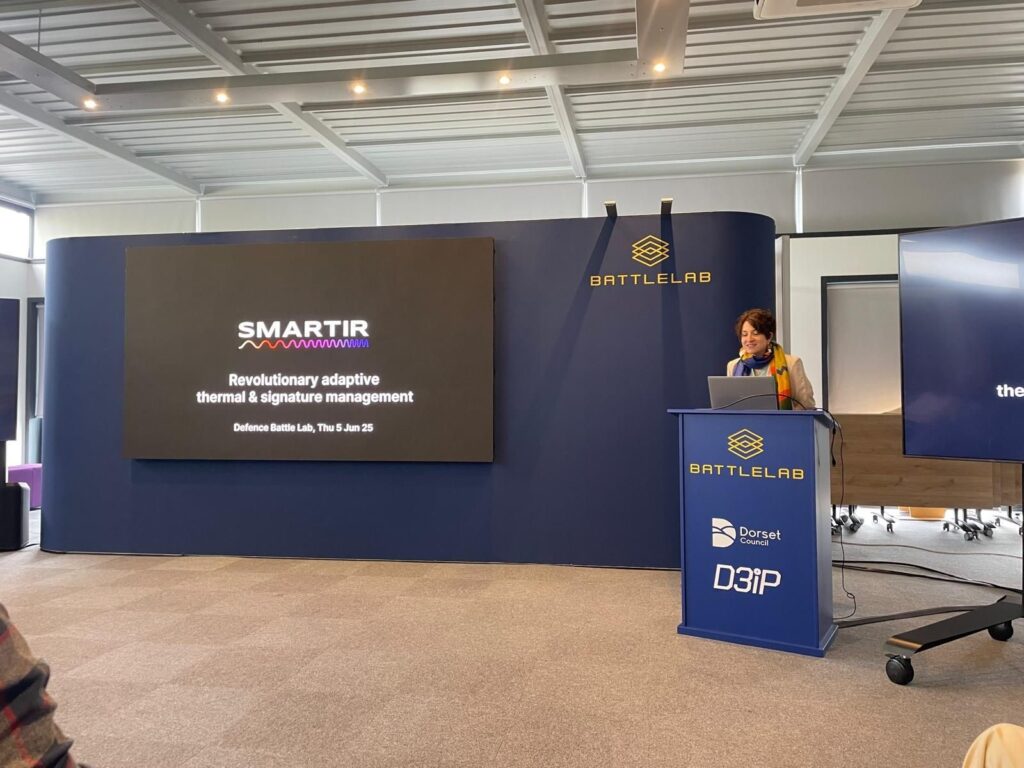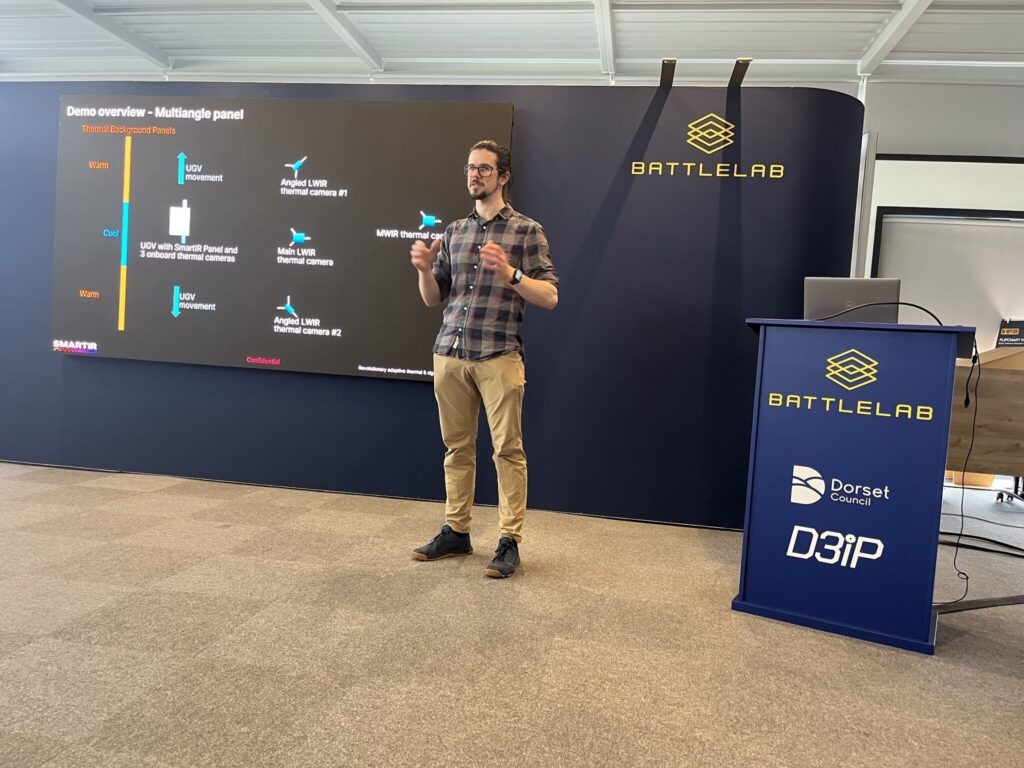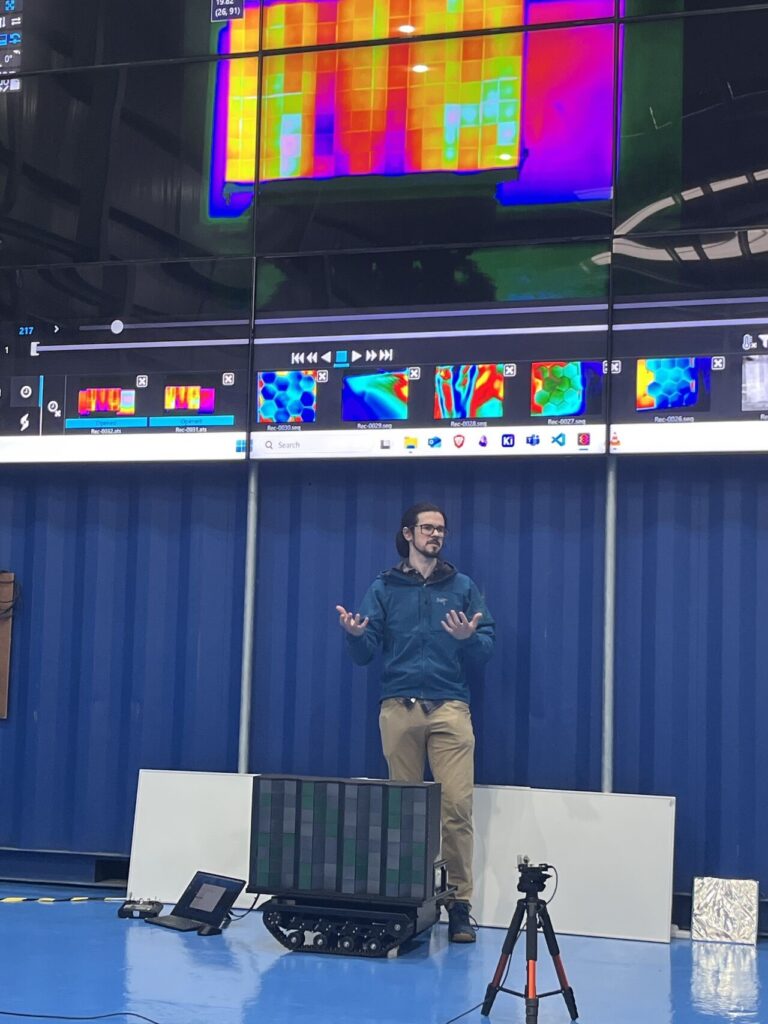
Latest News
05 June -2025
Successful Demonstration Day at the Battle Lab
Today a major milestone achieved! 🎉
After an incredible 2-year journey with Defence and Security Accelerator (DASA), we’re proud to have completed this exciting project by hosting a Demonstration Day at the BattleLab in Dorset.
The demonstration was a success — we showcased how the SmartIR technology could enhance survivability on both land and maritime platforms. This wouldn’t have been possible without the collaboration and support of so many fantastic partners.
🙏 A heartfelt thank you to:
DASA, for funding and supporting us throughout this journey.
Dstl and all the guests who joined us, asked thought-provoking questions, and shared valuable insights on potential Defence applications.
BattleLab, for hosting and facilitating such a great event.
And of course, the incredible SmartIR team — especially Ciaran Mullan, who led the project with vision and dedication, along with Coskun Kocabas, Pietro Steiner, PhD, John Patterson CB FIET and the rest of the team who made this possible.
🚀 We’re excited to continue the dialogue and explore collaboration opportunities to advance and deploy SmartIR technology across Defence applications. Together we can push the boundaries of what’s possible!



14 March-2025
Our second satellite is now in orbit!
Following the success of our first space mission, SmartIR has launched its second in-orbit experiment—Mission 2.1—aboard SpaceX’s Transporter-13 mission on the Falcon 9 rocket. This launch marks another key milestone in our mission to revolutionize thermal control systems for space applications.
Mission 2.1 is focused on testing our next-generation smart radiator design, featuring mechanical and performance enhancements based on insights from Mission 2.0. In addition, this mission debuts SmartIR’s new solar-reflective infrared coating, engineered to further optimize thermal regulation by reflecting solar radiation while maintaining adaptive emissivity in the infrared spectrum.
28 January 2025
SmartIR has been recognized as one of the ’10 New Defense Companies to Watch’ by the StartUs Insights Discovery Platform.
Read further details 10 New Defense Companies | StartUs Insights
18 January 2025
Exciting visit!
We were honoured to host Prof. Dame Nancy Jane Rothwell and Prof. Brian Cox at the SmartIR lab in the Graphene Engineering Innovation Centre (GEIC). Their visit provided a wonderful opportunity to showcase our latest developments in graphene-based infrared technologies and share our vision for translating cutting-edge research into real-world applications. We’re grateful for their inspiring presence and continued support for innovation and entrepreneurship at the University of Manchester.

15 January-2025
We Made It to Space!
We are thrilled to announce that the 𝐒𝐦𝐚𝐫𝐭𝐈𝐑 𝐌𝐢𝐬𝐬𝐢𝐨𝐧 𝟐.𝟎 satellite and payload have successfully reached space and are in great condition, continuously transmitting invaluable data back to Earth! 📡✨
Space is one of the harshest environments imaginable—extreme temperatures, intense radiation, and the relentless vacuum push every component to its limits. Yet, the 𝐒𝐦𝐚𝐫𝐭𝐈𝐑 payload is proving its resilience, maintaining daily communication with Earth.
A huge thank you to Hydra Space Systems, Alba Orbital, and AMSAT-EA for their support!
Over the next several weeks, the data we collect will be crucial in evaluating how our smart radiator performs under these extreme conditions, providing critical insights to advance the next generation of our 𝐒𝐦𝐚𝐫𝐭𝐈𝐑 space technology.
A few years ago, reaching space was just an ambitious goal. Today, through innovation, collaboration, and dedication, we are pushing boundaries and laying the foundation for new space applications that will transform our daily lives.



1 July 2023
SmartIR awarded 2.5M€ EIC Transition project
🚀 Exciting News from SmartIR! 🌌
We are thrilled to announce the launch of our ground-breaking two- year project: Revolutionizing Spacecraft Thermal Control with Dynamic Graphene Radiators: SmartSat. This innovative initiative is a significant leap forward in the aerospace industry, and we’re proud to lead this new venture starting today!
🌟 Project Overview:
SmartSat is set to transform how we manage thermal control in spacecraft. By leveraging the exceptional properties of graphene, our dynamic radiators promise to enhance efficiency and reliability in extreme space environments. This technology will not only support current space missions but also pave the way for future explorations.
🌐 EIC Transition Project:
SmartSat is an 2.5M€ EIC Transition project, marking a pivotal moment in our journey towards advanced space technologies. This status reflects our commitment to pioneering research and development in the aerospace sector.
💡 Funded by InnovateUK:
We’re honoured to have the support of InnovateUK, the UK’s innovation agency. Their funding is instrumental in bringing SmartSat from concept to reality, ensuring the UK stays at the forefront of aerospace innovation.


1 May 2023
Mission 1- We sent smart radiator technology beyond Earth’s boundaries and into the Stratosphere.
Today marks a defining moment in SmartIR’s journey. In collaboration with the incredible team at Sent Into Space, we successfully launched our first space mission, taking our smart radiator technology beyond Earth’s boundaries and into the Stratosphere.
Despite last-minute technical challenges, the unwavering dedication, ingenuity, and teamwork between both groups made this ground-breaking achievement possible. Our adaptive thermal tiles were put to the test in near-space conditions, demonstrating the potential of SmartIR’s technology for future satellite and aerospace applications.
Mission 1 is more than a milestone—it’s the beginning of an extraordinary journey into the cosmos, powered by innovation, passion, and collaboration.


April 2021
SmartIR awarded Innovate Smart-Grant
SmartIR has been awarded its first grant, a prestigious Innovate UK Smart Grant, securing £350,000 in funding for developing graphene-enabled thermal radiators tailored for small satellites. This innovative project, aims to leverage graphene’s exceptional thermal management properties to enhance satellite performance, reliability, and efficiency in space environments.

11 November 2021
SmartIR Signs Contract with European Space Agency
SmartIR, a spinout company from the University of Manchester, has signed a contract with the European Space Agency Business Incubation Centre United Kingdom (ESA BIC UK) to support their work to develop solutions to control thermal radiation on demand.
There is a need, within the space sector, to provide cost-effective thermal management solutions to both low orbit satellites, where the use of heaters reflects in higher power consumptions and to long orbit satellites, where heavy and bulky solutions (i.e. thermal Louvres) are currently adopted. SmartIR offers a paradigm-changing technology which will enable satellites to flexibly manage thermal energy, venting heat fully from all surfaces when in Earth’s shadow then selectively shielding only the side closest to the sun during orbit.
Prof Coskun Kocabas, SmartIR’s Scientific Director, said: “Small satellites experience thermal gradients across their structures of up to 200 C between sun-facing and earth-facing aspects and thermal control systems are designed to maintain them within acceptable temperature conditions. SmartIR’s radiators are an ideal solution as they are lightweight, have low power consumption, respond swiftly, operate over the entire infrared spectrum and involve no moving parts.”
SmartIR was formed with help from the University of Manchester Innovation Factory by Prof Kocabas, expert in optical properties of graphene, Dr Margherita Sepioni, who has eight years’ experience in commercializing graphene into early-stage businesses and Paul Kahn, former CEO of Airbus Group UK. SmartIR was incorporated in early 2020, with the help from the University of Manchester Innovation Factory, with the current primary focus on product development and testing validation to meet the space requirements.
SmartIR has joined the ESA BIC UK at STFC’s Daresbury Laboratory and received a £43K incentive to test their technology in space. The programme includes access to business and technical support, as well as access to science and innovation campuses, including Sci-Tech Daresbury where the company will have an office. SmartIR will also have access to the Science and Technology Facilities Council’s space facilities, under the supervision of Thales Alenia Space.
A spokesperson from Thales Alenia Space, said: “Our spacecraft are traditionally designed ‘cold biased’ with electric heaters used to ensure the equipment is kept above its minimum temperature. Using a variable emissivity graphene-based thermal radiator could allow us to reduce its radiative capacity in the cold scenarios and, in that way, save significant power. The SmartIR materials could help us achieve this objective using a technology that is robust and easy to control.”
Paul Kahn, Cofounder, said: “I am delighted to see the potential of this exciting University of Manchester spinout recognised by the European Space Agency and the Science and Technology Facilities Council. Space is one of many opportunities to apply adaptive emissivity graphene technology to make a step change in performance and capability for complete systems and even platforms. Our technology will create a massive reduction in satellite power consumption …a truly game-changing opportunity.”
Dr Margherita Sepioni, SmartIR’s COO, said: “SmartIR is aiming to becoming a qualified supplier of thermal management solutions for the space market, and this agreement with ESA BIC UK is a very important landmark along our journey. We are looking for further investments and collaborations to ensure we can revolutionise the area of thermal management solutions, in a wide range of applications, and look forward to exploring growth opportunities with visionary organisations.”
The ESA Business Incubation Centre United Kingdom (ESA BIC UK) provides the support and funding that start-up companies need to turn their ideas into profitable products and services using space technology, or to develop technologies for use in space. The ESA BIC UK is managed and partly funded by the Science and Technology Facilities Council (STFC), in collaboration with ESA Space Solutions, the University of Leicester and the UK Space Agency. www.esa-bic.org.uk

